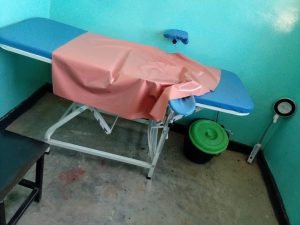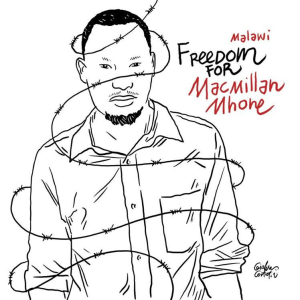WHEN MALAWI’S MENTAL HOSPITAL WAS A PLACE OF DEATH

Malawi’s Public Servants And How They Achieved Reduction in Deaths
BY JOSEPHINE CHINELE
Zomba Mental Hospital (ZMH), 70 kilometres north of Malawi’s business capital, Blantyre, used to be a place where mental health patients were brought to die. While mental conditions led to suicide, violent actions, trauma from beatings, and infected wounds caused by having been tied up by desperate relatives, untreated HIV, malaria, diarrhoea, and TB also played their part. Up to 2006, out of a total average patient population of 400, the death toll averaged 60 per year.
In 2021, the death toll for the whole year, over the same 400 beds, was eighteen.
In past decades, Malawi’s only state mental healthcare facility has benefited from what might be called the advantage of disadvantage. The social stigma attached to mental health conditions meant that sites for such patients were shunned by many functionaries, careerists, and even charitable institutions. As a result, a minority of professionals turned Zomba around from a close-to-medieval nightmare to a still poor but functional place of treatment and care.
Iron lady

One leading individual, now retired, is fondly remembered as the “iron lady” who initiated the change: Dr Immaculate Chamangwana, psychiatric nurse and nursing director with a PhD in healthcare leadership philosophy. It was Dr Chamangwana who, even before she was appointed ZMH acting director in 2006, started telling the political powers-that-be that the hospital and its patients needed more and better.
Frustrated after having nursed patients for years amid sewage leakages and congested wards in uninhabitable buildings, she remembers how she first got to speak out at a high-level budget meeting at the Ministry of Health in Lilongwe, the political capital, in 2002. The proposed budget for ZMH on the table in that meeting for the whole year amounted to 11 million Kwacha: US$ 6,500.
“This was the most painful moment,” Chamangwana recalls in an interview. She had brought her proposed budget, but it had been rejected for the fourth time in four years. She had previously kept quiet since such meetings, attended by high-ranking dignitaries, provided little or no room for negotiations. This time, she said, “Conditions at ZMH are very bad. This is a hospital; nobody chooses to be there. You will only get to understand the state it is in and why we have presented this budget that you have shot down when one of you is admitted.”

STREAMER: “You will understand when you are admitted,” the nursing director told the Ministry
It was a turning point. The budget was more than doubled. The K25 million, about US$ 15,000, enabled the institution to rehabilitate eight wards and construct occupational therapy and administration blocks.
Other improvements followed, and the government continued to reward the positive precedent with increased funding, leading to an allocation 2023 of almost 2 billion Kwacha, close to US$ 1 million. Partly out of continued necessity, since the hospital remains far from the scope of charitable, religious, and other donors, ZMH remains one of Malawi’s best government-funded healthcare facilities.
The facility has also introduced a paying ward in the past few years, where “high class” patients who benefit from medical aid and insurance can pay for bills. This private wing cross-subsidizes the state-funded part of the hospital.
Vultures
Under Dr Chamangwana’s leadership, the corrupt syndicates that permeate Malawi’s state machinery, siphoning money from state coffers, found that ZMH had become resistant to their usual fleecing. The retired director remembers receiving personal phone calls from different suppliers, informing her that they had submitted their applications for goods ranging from kitchen and construction materials to bedding to medical utilities.
These suppliers would offer kickbacks when supplies were ordered from them, often in inflated invoices for goods of low or non-existent value. “I had to protect myself from such influence and ensure transparency,” Dr Chamangwana recalls. “I told the callers that I was not involved in the procurement process, that the process was done transparently, and that there was no preferential treatment.”

When she found, at one point, that two employees were intending to manipulate the procurement process, she verbally warned them. On another occasion, she reported three accounts personnel who “were making false payments to suppliers who were not prequalified and never supplied goods to the facility.” The three were arrested, tried, and convicted for fraud.
Since then, ZMH has intensified its financial management systems, holding extra mid-year reviews to scrutinise all procurement and finances.
STREAMER: Zomba intensified its financial management systems
Also exceptional in Malawi is that ZMH has motivated its staff to refrain from demanding extra payment from patients, even if salaries remain low. This starkly contrasts with practices common in Malawi’s other healthcare facilities, like patients’ lab results going “missing” or repeated delays in treatment and surgery appointments, which can only be resolved after the money has changed hands. During the COVID pandemic, in Malawi’s best-known Queen Elizabeth Central Hospital, it was reported that health workers routinely demanded up to K40,000 (over US$40) from a deceased’s relatives for them to “disinfect the body” before collection for burial. People who could not pay had to wait for hours to receive the remains of their loved ones.

But, according to all sources ZAM spoke to, there is nothing of the kind going on at ZMH. “Those who have been to our facility will testify that no healthcare worker demanded money in exchange for a service,” ZMH spokesperson Harry Kawiya says proudly. “Our nurses even go to Zomba Central Hospital to bathe and feed our clients referred there for physical diseases, at no extra cost.”
Hands-on Supervision
President of the Physician Associates Union of Malawi, Solomoni Chomba, observes that one of the reasons ZMH has high integrity is “because it’s a specialised institution with few separate departments” compared to central hospitals, while the mental health focus also unifies its staff vis-à-vis the “high stigma associated with (such) issues.”
But according to those who experienced the change over the past two decades, there has been more to it than that. Firstly, ZAM is told ZMH staff are compensated for overtime, a practice that should be routine for all state workers in Malawi but seldom is. Secondly, the Chamangwana-led management introduced performance rewards and adequate training from the start; her administration also took care that nurses and doctors had suitable and sufficient medical supplies to work with.
Medical clinician McEvans Phiri, who had worked at the hospital in previous years “in an environment of zero motivation,” recalls how things changed as soon as Dr Chamangwana ascended to management.
“She personally supervised the wards. She was so hands-on that nobody wanted to remain behind; we all strived to deliver quality care.” ZMH’s first Director, Felix Kauye, who led the hospital in the early 2000s when Dr Chamangwana was still head of nursing, adds that credit should go to her even before her promotion. “I was also studying, so it was Dr Chamangwana who was on the ground.”

Notably, the new management also brought in young and passionate recruits to fill vacancies. A new team was set up to address the patients’ many physical ailments. “I will live to remember how (our) teamwork reduced the death rate from an average of 60 deaths per year to a fraction of that,” says Chitsanzo Mafuta, who was one of the new nurses then and is now a public mental health specialist.
STREAMER: “I will live to remember how teamwork reduced the death rate.”
Previously, patients with physical diseases, conditions, wounds, and infections had been routinely transported to the local Zomba Central Hospital (ZCH). Like in all hospitals in Malawi, ZCH staff were overworked, and much of the routine care of patients was left to relatives, called “guardians”, who stayed with them.
With most hospitals in Malawi frighteningly overcrowded, dirty and unhygienic, with stinky and poorly lit bathrooms, damaged and unlockable doors, and poor sanitation all around, these guardians are forced to carry around recycled bed pans, exposing themselves and others to infections.
The situation was even worse for ZMH patients who were transferred here since, due to the stigma surrounding mental illness, they were often discriminated against by staff. At the same time, they also did not have guardian relatives around to look after them.
“We managed to procure antibiotics, painkillers, and other meds, and we started to treat them at ZMH itself,” Mafuta says proudly. “This is what brought about the reduction in deaths.”
A Generally Corrupt Environment
Despite its current performance, scarcity of medicines and lack of trained medical staff – features of what experts call a “generally corrupt environment” – still affect Zomba Mental Hospital as much as other health facilities.
For example, the state medications procurement scandals have plagued supply agency Central Medical Stores (CMS) and often fail to provide much-needed drugs to the facility.
According to ZMH spokesman Harry Kawiya, this forces the hospital to buy medicines such as antipsychotics and antidepressants from private pharmacies, which is expensive. Like other hospitals, ZMH also suffers from a lack of competent staff.

It is the “general corrupt environment” that, according to Solomoni Chomba, needs to be addressed. “The root cause of the corruption is not the health workers. The government system perpetuates it,” he says. “If the state would provide sufficient staff and resources, (overworked) health workers who are paid peanuts for their survival would less easily fall into the corruption trap.” In a follow-up interview, Dr Chamangwana agrees that “the situation would improve if the government were to employ many of our capable graduates. We are always talking about staff shortage, yet many are unemployed.”
Dr Chamangwana also points out that significant amounts could be saved through better management right at the top.
“The Ministry should better govern equipment inventory and care (in hospital facilities), encourage management to take care of equipment, and have proper records and inventories. Now we keep buying the same things due to institutions’ carelessness.” She adds, “The Ministry should also be holding individual hospital leadership to account on institution failure, support hospital management, and encourage institutions to have plans and budget focus.”
STREAMER: “You can’t sustain excellence if you don’t have gloves and soap.”
For eight years, Dr Chamangwana tried to do as much as she could in this respect. After stabilising the management of ZMH, she took up a post as deputy director of nursing and midwifery policies at the Ministry of Health in 2008, supervising the delivery of nursing services in health facilities nationwide for the next seven years.
She achieved some success when certain facilities were recognized as centres of excellence and received awards, but she admits that many of the improvements were not sustainable. “It was hard to sustain being a centre of excellence if you don’t have resources such as aprons, gloves, soap and buckets, among other things.” She left the post to return as ZMH director in 2015.
A Small Budget
Public social accountability monitoring expert Wales Chigwenembe believes Malawi’s health expenditure, with a yearly budget of approximately US$ 200 million for a population of 20 million, is too small to begin with.
“We should commit 15% of our state budget to health, as per the Abuja agreement, but we don’t. It is now more like 8%,” he says, referring to an agreement signed by many African countries, including Malawi, in 2001.
And while (mainly Western) developmental partners are substantially subsidising this budget, Malawi’s government remains in charge of appointments and sector oversight, where, according to Chigwenembe, the core of the problem lies.
“Over 40% of the budget goes to personal emoluments such as salaries and expenses. The rest goes to drugs and other commodities procurement. (In both financial streams) funds are misused. As a result, we are maintaining a 50% vacancy rate. We also keep borrowing to keep things going, which has led to the accumulation of huge debts. Malawi’s priority now is to service these debts.”

Chigwenembe strongly believes that if the country committed 15% of its budget to health while addressing corruption, mismanagement and misalignment of resources, it would have the space to recruit more staff, deal with drug stock-outs, and manage to deliver quality health services.
STREAMER: “The hospitals are doing well,” says the Ministry
While the Ministry of Health has awarded ZMH an Excellence Award in Infection Prevention and Control and has sent staff and interns to gain experience at the facility, it denies that Malawi has a general problem with managing its other hospitals.
The Ministry’s top functionary, Principal Secretary Dr Samson Mndolo, when asked if the management model of ZMH should not be replicated elsewhere, states, “We have five central hospitals (which are) doing well as far as management is concerned.”
He adds that “the Ministry has a directorate which oversees (…) the hospitals to ensure that quality services are being provided (…) as well as good infrastructure and clean environment.” He furthermore comments that it would be “unfair” to compare the central hospitals with Zomba Mental Hospital since the central hospitals “require different specialities and departments as well as medicines and supplies,” and asks if ZAM could “share the tool” it has used to make such a comparison.
Dr Mndolo further says that the Ministry is “engaging with partners” to increase the health budget to the required 15% and plans to deploy 2,731 more healthcare workers over Malawi’s 483 health facilities in the next financial year. Regarding the corruption scandals at CMS, he says that “new executive management has been appointed from 2021, and there is (now) transparent and accountable tendering, stocking, stock-taking, and supplying.”
The Food is Not Enough
One of ZMH’s former patients, Jerome (name changed), told ZAM that he was generally happy with the treatment and care he received at the hospital. “The staff really works hard. Patients come in difficult conditions, sometimes dirty, sometimes in chains or handcuffs, but they are managed and psychologically prepared for treatment. The workers also ensure that patients are protected from harm. For instance, if they get a report that a person in ZMH uniform has been spotted at nearby shops, an ambulance hurries there to get them back.”

Another former client, Chimwemwe (name changed), who says she had initially been reluctant to be admitted, said she was reassured when she had found it was “a clean place with (clean) bedding and bathrooms. They regularly cleaned and disinfected the wards and bathrooms. We were provided with soap, lotion, and tissues.” She adds that she wishes that churches, NGOs and other well-wishers would also donate to and visit ZMH, because “the patients at this facility also need affection.”
According to Jerome, extra food would be welcome, too. “(When I was here) for breakfast, it was only a cup of porridge, and for lunch, one piece of nsima (a starchy, thick porridge made from corn flour) served with some vegetables, beef or soya pieces.” Mentioning that some clients “escaped” because of hunger, he points out that the meagre diet is “torturous, as most patients are on medications that require sufficient food.” Furthermore, he explains that at Zomba, relatives often live too far away to come by and bring meals, as in other hospitals.
But he still doesn’t blame the staff for the food scarcity. “So many workers work overtime here, including security people whom I have noticed to be on duty for 24 hours without resting.”
PUBLIC SERVANTS|MALAWI, KENYA, UGANDA, NIGERIA, GHANA
How Dedicated Officials Help the Public From Within
BY JOSEPHINE CHINELE, TAIWO ADEBULU, NGINA KIRORI, ZACK OHEMENG TAWIAH & STEPHEN KAFEERO
In many countries, public services are inadequate or completely dysfunctional. Yet some public servants provide effective healthcare, public transport, emergency assistance or necessary paperwork despite corrupt or mismanaged systems. But why are these practices ignored, or sometimes even deliberately side-lined, rather than used as examples for emulation by the authorities? A new ZAM transnational investigation shines a spotlight on public servants whose work can inspire the fight for change.
The investigative team found dedicated officials who work wonders with small resources in Ghana, Nigeria, Malawi, Kenya, and Uganda. In all five countries, they also found that these public servants often battle alone.
The team asked: why do the clinics, companies, and other services in these case studies remain islands amid dysfunction and corruption, and why aren’t those who govern using and building upon these models? It became clear that there is a massive lack of political will in this regard.
The answers received from the relevant authorities were similar in number to the responses a Kenyan firefighter got when he proposed better rescue systems to his national government: save for one all-out denial of the problem, zero.
Malawi
One Nurse Against a Hierarchy
“We do quality monitoring, and our central hospitals are doing well,” writes the Principal Secretary of Malawi’s Department of Health, Dr Samson Mndolo, when asked about the widely observed problems of filth, overcrowding, and pilfering of medicines in the country’s dilapidated hospitals. One small psychiatric hospital in Zomba in the east of the country stands out as an exception – but while his department has allocated an excellence award to Zomba and even sends interns to train there, it has not felt the need to help reproduce Zomba’s practices of passion, professionality, and transparency. The other hospitals “are doing well”, after all.
While the ZAM reporters wonder in which universe Dr Mndolo – the highest functionary in the Ministry of Health – exists, at least he sends answers. Which makes Malawi’s authorities significantly more responsive than the ones in the other four country case studies.
Perhaps Malawi is a bit more alert to being challenged. That may be because one uppity psychiatric nurse by the name of Immaculate Chamangwana stood up twenty years ago, at a budget meeting at the same Ministry of Health, to tell the assembled dignitaries that much more money was needed for the hospital where she was in charge of over 400 beds and over 1,600 admissions of people per year: patients who were either suicidal, or suffered from schizophrenia, or were fighting against ropes and chains their desperate families had bound them with. Often, they had infected wounds, were HIV positive, had fever from malaria, or suffered from other physical illnesses. And the department had allocated only the equivalent of US$ 6,500 for the institution for the year.
Malawi may be poor, but it isn’t that poor, certainly not with the millions in development aid in healthcare it receives. So Immaculate Chamangwana told the hierarchy that this was simply not good enough, “which you would understand if you were admitted.” It worked. The nursing director went home with more than double the initial budget. From then on, started building the hospital, hiring young, passionate healthcare workers, and setting firm standards for accountability and transparency. Zomba Mental Hospital now handles 2,734 admissions per year, up from 1,675 in 2006, when Chamangwana first became acting director. The number of patients lost to disease has gone down from 60 in 2006 to eighteen in 2021. “If they could just tackle mismanagement in the entire health sector,” says public accounts specialist Wales Chigwenembe wistfully, “We could really do better.”
Nigeria
A systems thing
Federal Medical Centre Ebute-Metta in Lagos State, Nigeria, is doing much better than it did under the old management that failed to fix dilapidated roofs and had patient files strewn all over the place.
Now, clients like Smart Ogbe and his mother come from far away, even when in need of emergency rooms: “I can get my mum’s treatment quicker and better here,” he says. “There are no queues, and you are also not stopped by people asking for bribes at every turn.”
Proper management, which is what Adedamola Dada brought in when he became Chief Medical Director in 2017, is not that hard to figure out. Dada explains: “It’s about building human beings, building the structures, and building the process in the workforce. It’s a system thing.”
The system in FMC Ebute-Metta is built on appropriate monitoring, bookkeeping, stocktaking of drugs, discrepancy alerts, and transparent filing, all helped by automation. These features, to those who have a modicum of management expertise, are not rocket science, but other hospitals all over Nigeria seem to be led by Ministry of Health appointees who have difficulty figuring this out.
Which is perhaps not surprising since the Ministry of Health does not even have its own website or contact details in order. There is no phone number to call, the contact form does not work, and the spokesperson herself, Patricia Deworitshe – though often in the news when she presents governmental press releases and speeches – simply does not answer direct calls or WhatsApped questions, even when sent repeatedly over a week.
Ghana
A Manager Who Needed His Head Examined
Ghana, too, is familiar with incompetence in its state machinery. Perhaps the success of the State Transport Company, after a dismal history of bleeding losses and near-bankruptcy, is because nobody wanted the position to head it in the first place.
This phenomenon might be called the advantage of disadvantage, just like in Malawi, where a mental hospital position also did not attract many careerists. After all, as a Ghanaian political observer and op-ed writer at the time wrote, the President, who appointed the MP who had come forward to volunteer for the post, had thought the man in question “needed his head examined.”
But the MP in question, a businessman with a marketing background called Nana Akomea, simply had a sense of customer service. Akomea brought the State Transport Company back from the brink, doubling the number of staff from 400 to 800 and even making it profitable – the STC is now the only income-generating state enterprise in Ghana. Akomea explains simply:
“Which customer walks half a kilometer, when other buses are nearby?” The new management brought buses back to the city terminal, got the vehicles maintained and the drivers trained, installed wifi and a functional customer call service, and voilà! To the chagrin of less-organised and often breaking-down, private rickety-bus operators, customers now used the state bus service again.
It wasn’t rocket science here, either. The question to ask, the team found once again, is perhaps not what was so special about what managers like Chamangwana, Dada, and Akomea did, but why the previous managers, and the managers elsewhere in the public service, don’t.
Uganda
If the President Wants It
An answer of sorts was found in Uganda, where high-quality management processes were seamlessly introduced, maintained, and even surpassed, in the driver’s license office. Remarkably, this happened by order of the president himself.
Ageing autocrat Yoweri Museveni (79), in his decades of ruling Uganda since 1986, has been known for his largely unsuccessful efforts to run the whole state by himself. He has, however, had incidental and irregular successes in certain sectors.
When he put his mind, and a battery of loyal functionaries, to it, the Uganda Revenue Service perked up for a while https://observer.ug/news-headlines/43614-corruption-kagina-battling-bravely-but-how-sustainable-are-her-heroics. So did Kampala City management https://www.monitor.co.ug/uganda/news/national/kcca-executive-director-resigns-1784184. Now, it is the turn of the Uganda Driver’s License Service, an office from where Ugandans, document in hand without having paid a bribe, have reported exiting almost jubilantly. “Amazingly efficient, it took me only one hour” is just one post out of hundreds on social media.
Ugandans were used to waiting for state documents in up to 100-metre-long queues outside in the blazing sun or pouring rain, preyed upon by middlemen promising to move you forward in exchange for money, and then still not getting the service after going through the same ordeal time and time again.
The one exception was the driver’s license office, which had been privatised for two decades and was functioning well as a private business. There was an uproar when the cabinet announced it would become a state-run entity again; the public worried that the driver’s license office would become another corrupt and dysfunctional state service.
But when the state resumed ownership of the UDLS in 2020, just in time for elections, citizens were amazed to find that processes that the private company had introduced, such as a coherent and well-monitored database, efficiently managed staff, and transparent accounting, not only remained in place, but had been improved upon.
“This is because our department is closely monitoring,” the Transport Ministry boasted, mentioning Key Performance Indicators and other management practices.
Uniquely among the five countries in our investigation, project coordinator Andrew Kagoda proudly told our reporter about plans to replicate these efficient document-processing systems in the traffic police departments as well as the national identity and passport offices.
When the team checks on the progress of the national identity and passport services, reality kicks in. Some citizens have been trying to get ID cards since 2014, having spent hundreds of dollars on bribes in the meantime.
One interviewee reports living from cash jobs, being unable to vote, or having a bank account. When reached by phone, the head of the ID service explodes in anger, blaming old machines and lack of funding, then fails to follow through on an agreed meeting, where the reporters had planned to ask about millions that have gone missing at her office.
A spokesperson asked when the announced replication of good practice will take place, gave one glib answer, and then stopped answering altogether.
Just two years before new elections in 2026, when Museveni will be 82, and all citizens will need new ID’s to vote, with democratic opposition to one-person-rule growing, we are back in the old Uganda.
Kenya
A Life-Saving Governor
Governor Muthomi Njuki of Tharaka-Nithi county, a rural sub-state in Kenya’s eastern parts, is by all accounts doing rather well. He has health volunteers checking on those who are poor and sick, getting them to the hospital at the state’s cost when needed.
He has objected to new million-dollar headquarters for his county government, preferring to stay in old, corrugated roof-buildings because the expenditure is just too much. To save money, he also fired 130 functionaries whose duties and qualifications were unclear.
With his prudent administration, skilful approaches to donors to top up the budgets where needed, and headhunting of the bravest and most passionate to take up difficult jobs, he has built a formidable rescue service encompassing paramedics, firemen, and other emergency services to assist at road and other accident scenes.
Shiny red fire trucks parked under trees in three offices’ yards in his county are praised as beacons of hope by citizens, whose children used to drown in rivers, whose shops used to burn down, or who were left to perish on roads after car crashes.
Governor Njuki is just as reluctant to answer the team’s questions as the functionaries who are asked to respond to questions about incompetence.
“I care about saving lives,” is all he says, refusing to answer questions about incompetence and malfunction in other counties or even about political fights he has had, or still has, with rival politicians (who once accused him of corruption). No, he cannot comment on counties which “have their own leadership,” he says and stays mum on issues of the ruling party, of which he is also a member. It is unclear whether he is more cautious regarding his own party or fearful of his rivals.
Why is Njuki so reluctant to boast of his success? In the end, is it even more difficult for a politician to stand up against systems of rot and fight them from within than it is for a nursing director or bus manager? If so, then the next question presents itself: how can both fights from within be supported?
It is a question that ZAM intends to pose to both change-makers in the countries where we work as development partners who profess to support social justice and accountability.
This article was first published by ZAM Magazine here as part of a transnational investigation into islands of excellent public service in Kenya, Uganda, Nigeria, Ghana and Malawi.





